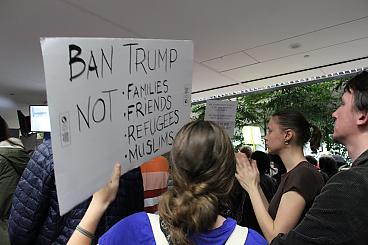Points of agreement between Timmermans and Trump
Points of agreement between Timmermans and Trump
This weekend has a great deal of justified criticism aimed at the policies of brand new US President Donald Trump, in particular his closure of the country’s borders to travellers from a number of Islamic countries. European Commission Vice President (and former Dutch Foreign Minister) Frans Timmermans is amongst those who have already protested. Yet this same Timmermans has co-authored the plan, that appeared this week, aimed at putting a stop to immigration from North Africa. Following the Turkey deal, Timmermans now wants to see a Libya deal. Of course the Commission’s choice of wording is less unpleasant than that of Trump, but the message and its effects will be similar: refugees, find salvation - but elsewhere. It already seems a long time ago that politicians dared assert that people who are persecuted are in need of protection.
Trump is going a long way with his travel ban, but the European Union has been busy too. If you’ve got a visa, the EU won’t go to the same lengths as the US, but to refugees from nearby war zones the doors are firmly shut. To achieve this the EU has really pulled out the stops. Do business with controversial Turkish President Recep Erdoğan? No problem, as long we can seal a deal under which refugees who arrive via Turkey can be sent straight back. This week the Commission will even go a step further, signing a comparable deal with the Libyan government. Anyone who arrives from Libya without the required papers can clear off back there right away. One slight problem: in Libya the government hardly governs and the militias have a great deal more power. But this is scarcely mentioned in the Commission proposals.

According to the Commission, last year 181,000 people arrived in the EU via the central Mediterranean without the necessary papers, most of them in Italy. Half of this group applied for asylum. Some 28,000 were minors, most of them unaccompanied by parents or other family members. In common with those who did not apply, the asylum- seekers are described as ‘illegal immigrants’. In labelling them thus, the Commission forgets to mention that as a refugee you are not obliged to have any papers. If you have to drop everything and flee from your home, you don’t have time to organise your passport and visa. That was the thinking behind this, and it remains so. But for the Commission they too are simply illegal immigrants.
In the future the Commission wants anyone without papers to be returned to, amongst other places, Libya, and they are willing to help in improving the reception capacity there. In exchange, the EU, just as was promised to Turkey, will accommodate refugees, and particularly those from vulnerable groups, in the member states. How many refugees can still be accommodated in this fashion the Commission has not said. A generous policy would run one or more camps in North Africa from where refugees could come to the EU in a safe and comfortable manner. That sounds good, but will quickly exhibit a suction effect: the journey to these camps is a bit easier than is crossing the sea and could lead to larger groups of people applying for asylum in the EU. If the policy isn’t generous, refugees will be doomed to sit out their days in Libya, where the possibilities for integration and of a humane and dignified existence are lacking.
Timmermans is sticking obstinately to his line, yet things could be done differently. Organise at last an international conference on the protection of refugees from countries such as Syria, Iraq, Afghanistan and Eritrea. Involve all of the countries in the region, including the entire Arab world. Put pressure on those such as the United Arab Emirates and Saudi Arabia to take their share of refugees. The EU should then offer to do the same, which would separate us from American isolationism, opting instead for realistic international solutions. This would mean there would be no need to deliver oneself into the hands of a controversial leader or a bunch of militias, but instead you would be making use of the United Nations High Commission for Refugees. Once upon a time we in the Netherlands heartily approved of the UNHCR. I greatly hope that people like Timmermans will see things in that way once again.
- See also:
- Dennis de Jong
- Europe
- World
